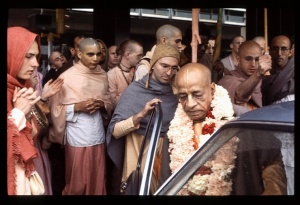BG 9.31: Difference between revisions
m (1 revision(s)) |
(Vanibot #0020 edit - link to the Version Compare feature) |
||
| Line 1: | Line 1: | ||
{{ | [[Category:Bhagavad-gita As It Is (1983+) - Chapter 09]] | ||
<div style="float:left">'''[[Bhagavad-gita As It Is (1983+)]] - [[BG 9 (1983+)|Chapter 9: The Most Confidential Knowledge]]'''</div> | |||
<div style="float:right">[[File:Go-previous.png|link=BG 9.30]] '''[[BG 9.30]] - [[BG 9.32]]''' [[File:Go-next.png|link=BG 9.32]]</div> | |||
{{CompareVersions|BG|9.31|BG 1972|BG 1983+}} | |||
{{RandomImage}} | |||
==== TEXT 31 ==== | ==== TEXT 31 ==== | ||
<div class="devanagari"> | |||
:क्षिप्रं भवति धर्मात्मा शश्वच्छान्तिं निगच्छति । | |||
:कौन्तेय प्रतिजानीहि न मे भक्तः प्रणश्यति ॥३१॥ | |||
</div> | |||
<div | <div class="verse"> | ||
:kṣipraṁ bhavati dharmātmā | |||
:śaśvac-chāntiṁ nigacchati | |||
:kaunteya pratijānīhi | |||
:na me bhaktaḥ praṇaśyati | |||
</div> | </div> | ||
==== SYNONYMS ==== | ==== SYNONYMS ==== | ||
<div class="synonyms"> | |||
<div | ''kṣipram''—very soon; ''bhavati''—becomes; ''dharma-ātmā''—righteous; ''śaśvat-śāntim''—lasting peace; ''nigacchati''—attains; ''kaunteya''—O son of Kuntī; ''pratijānīhi''—declare; ''na''—never; ''me''—My; ''bhaktaḥ''—devotee; ''praṇaśyati''—perishes. | ||
</div> | </div> | ||
==== TRANSLATION ==== | ==== TRANSLATION ==== | ||
<div class="translation"> | |||
<div | |||
He quickly becomes righteous and attains lasting peace. O son of Kuntī, declare it boldly that My devotee never perishes. | He quickly becomes righteous and attains lasting peace. O son of Kuntī, declare it boldly that My devotee never perishes. | ||
</div> | </div> | ||
==== PURPORT ==== | |||
= | <div class="purport"> | ||
This should not be misunderstood. In the Seventh Chapter the Lord says that one who is engaged in mischievous activities cannot become a devotee of the Lord. One who is not a devotee of the Lord has no good qualifications whatsoever. The question remains, then, How can a person engaged in abominable activities—either by accident or by intention—be a pure devotee? This question may justly be raised. The miscreants, as stated in the Seventh Chapter, who never come to the devotional service of the Lord, have no good qualifications, as is stated in the ''Śrīmad-Bhāgavatam''. Generally, a devotee who is engaged in the nine kinds of devotional activities is engaged in the process of cleansing all material contamination from the heart. He puts the Supreme Personality of Godhead within his heart, and all sinful contaminations are naturally washed away. Continuous thinking of the Supreme Lord makes him pure by nature. According to the ''Vedas'', there is a certain regulation that if one falls down from his exalted position he has to undergo certain ritualistic processes to purify himself. But here there is no such condition, because the purifying process is already there in the heart of the devotee, due to his remembering the Supreme Personality of Godhead constantly. Therefore, the chanting of Hare Kṛṣṇa, Hare Kṛṣṇa, Kṛṣṇa Kṛṣṇa, Hare Hare/ Hare Rāma, Hare Rāma, Rāma Rāma, Hare Hare should be continued without stoppage. This will protect a devotee from all accidental falldowns. He will thus remain perpetually free from all material contaminations. | |||
</div> | |||
<div | <div style="float:right; clear:both;">[[File:Go-previous.png|link=BG 9.30]] '''[[BG 9.30]] - [[BG 9.32]]''' [[File:Go-next.png|link=BG 9.32]]</div> | ||
__NOTOC__ | |||
</div> | __NOEDITSECTION__ | ||
__NOTOC__ | |||
Revision as of 22:41, 7 December 2017

A.C. Bhaktivedanta Swami Prabhupada
TEXT 31
- क्षिप्रं भवति धर्मात्मा शश्वच्छान्तिं निगच्छति ।
- कौन्तेय प्रतिजानीहि न मे भक्तः प्रणश्यति ॥३१॥
- kṣipraṁ bhavati dharmātmā
- śaśvac-chāntiṁ nigacchati
- kaunteya pratijānīhi
- na me bhaktaḥ praṇaśyati
SYNONYMS
kṣipram—very soon; bhavati—becomes; dharma-ātmā—righteous; śaśvat-śāntim—lasting peace; nigacchati—attains; kaunteya—O son of Kuntī; pratijānīhi—declare; na—never; me—My; bhaktaḥ—devotee; praṇaśyati—perishes.
TRANSLATION
He quickly becomes righteous and attains lasting peace. O son of Kuntī, declare it boldly that My devotee never perishes.
PURPORT
This should not be misunderstood. In the Seventh Chapter the Lord says that one who is engaged in mischievous activities cannot become a devotee of the Lord. One who is not a devotee of the Lord has no good qualifications whatsoever. The question remains, then, How can a person engaged in abominable activities—either by accident or by intention—be a pure devotee? This question may justly be raised. The miscreants, as stated in the Seventh Chapter, who never come to the devotional service of the Lord, have no good qualifications, as is stated in the Śrīmad-Bhāgavatam. Generally, a devotee who is engaged in the nine kinds of devotional activities is engaged in the process of cleansing all material contamination from the heart. He puts the Supreme Personality of Godhead within his heart, and all sinful contaminations are naturally washed away. Continuous thinking of the Supreme Lord makes him pure by nature. According to the Vedas, there is a certain regulation that if one falls down from his exalted position he has to undergo certain ritualistic processes to purify himself. But here there is no such condition, because the purifying process is already there in the heart of the devotee, due to his remembering the Supreme Personality of Godhead constantly. Therefore, the chanting of Hare Kṛṣṇa, Hare Kṛṣṇa, Kṛṣṇa Kṛṣṇa, Hare Hare/ Hare Rāma, Hare Rāma, Rāma Rāma, Hare Hare should be continued without stoppage. This will protect a devotee from all accidental falldowns. He will thus remain perpetually free from all material contaminations.